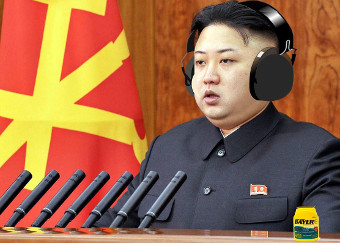
Photocomposition by Thursday Review
N. Korea Says Loudspeakers Are
An Act of War
| published January 10, 2016 |
By Thursday Review staff
North Korean officials say that their country is being pushed “to the brink of war” because of a South Korean loudspeaker system near the demilitarized zone which blares propaganda critical of the regime of Kim Jong-un, North Korean leader.
South Korea has maintained the loudspeaker system for decades, but its broadcasts have been minimal in recent years. Seoul requested reactivation of the broadcasts this week after North Korea tested a nuclear device—an apparent small hydrogen bomb—in defiance of United Nations rules and despite heavy sanctions placed on the isolated nation.
North Korea’s recent underground nuclear test came without warning, and caused an international furor this week. Even North Korea’s marginal ally to the north, China, expressed outrage that the test was conducted so close to the border. Concerns were raised by dozens of countries in the Pacific region, and the prime ministers and presidents of countries such as Japan, South Korea, the Philippines and Taiwan all expressed indignation and deep concern.
South Korea reactivated the speakers this week—which boom anti Kim news and information across the demilitarized zone and into towns and villages along the border. North Korea has long claimed the broadcasts are illegal and an affront, but this week said it now considers those loudspeakers and their audio message to be a provocation and an act of war.
Tensions between North and South have been running high for more than a year. North Korea is well known for its bellicose language and its threats of war, but military analysts worry that the young Kim Jong-un may be testing the limits of his power through a variety of dangerous and provocative moves. In the fall, North Korea tested a submarine-launched missile, but observers and analysts say that the test probably failed. And during activities along the demilitarized zone last year, two South Korean soldiers were injured (one lost a leg) when the soldiers encountered landmines which the South says were deliberately planted by the North. That fracas led the South to resume the ear-splitting loudspeakers for several days, during which the North retaliated by firing artillery shells in the direction of the broadcasts.
In Pyongyang, state-controlled television showed thousands attending rallies in support of the North, celebrations held in part to mark Kim’ Jong-un’s birthday, which was Friday.
Some weapons experts and intelligence sources suggest that the so-called “hydrogen” bomb detonated by North Korea may not have met the true criteria of a by-the-book H-bomb. Though geological agencies in a dozen countries measured what was described as a minor earthquake at the time when North Korea said it detonated the bomb, several experts have suggested that what the North Korean army tested was something short of a traditional H-bomb, possibly even a convention bomb laced with hydrogen and some radioactive materials. Other weapons experts have said that what North Korea tested may have bene simply another of its traditional atomic bombs.
North Korea has successfully tested atomic weapons in the past, but analysts are not in agreement that the isolated country has the technological capacity to construct a working hydrogen nuclear device.
In any event, several top U.S. officials—Secretary of State John Kerry and Defense Secretary Ashton Carter, to name but two—have been in regular communication with the leaders of Japan, South Korea, the Philippines, Malaysia, Brunei and other countries since last week’s announcement of the test by North Korea.
South Korea and U.S forces have been on edge since the test. The United State, in a show of force meant to perhaps push North Korea’s belligerence down a notch, dispatched several nuclear submarines to the waters near the Korean Peninsula, and on Saturday deployed a massive B-52 bomber into the skies over South Korea. The plane flew across the peninsula accompanied by U.S. F-16 jet fighters and by South Korea F-15s.
The heavy bomber is not only capable of delivering a powerful conventional punch to an adversary, but can also be armed—as per its original design—with atomic bombs.
American officials acknowledge that the B-52 flyover was symbolic, but that the action also indicates U.S. solidarity with its Asian partners, especially South Korea.
“This was a demonstration of the ironclad U.S. commitment to our allies in South Korea, in Japan, and to the defense of the American homeland,” Admiral Harry B. Harris announced in a statement to the media. “North Korea’s nuclear test is a blatant violation of its international obligations.”
North Korean media and officials in Pyongyang say that it is the right of their country to develop weapons and forge military doctrine in whatever way it deems appropriate, and Pyongyang points to the heavily militarized border with the South, which includes a substantial U.S. presence, as evidence of the threat it faces from south of the DMZ.
Related Thursday Review articles:
North Korea Claims Hydrogen Bomb Test; R. Alan Clanton; Thursday Review; January 6, 2016.
North Korea Able to Track Digital Files?; R. Alan Clanton ; Thursday Review; December 29, 2015.
